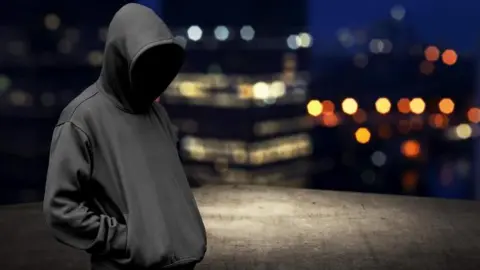Rise in drug trafficking in Derbyshire, report says
 Getty Images
Getty ImagesDrug trafficking in Derbyshire has increased by more than 60% compared to pre-Covid levels, according to new figures.
The report by the county's police and crime commissioner says the number of trafficking "occurrences" in 2024 was 1,034, compared to 636 in 2019.
It also said drug deaths in the county had increased by 10% over the past two years, though it did not say how many people had died.
Derbyshire Police said there were a number of factors contributing to the increases, including improved recording processes.
As of January this year, police had mapped eight county lines drug operations.
They shut down about 36 in 2024 and "significantly weakened" 179 others, with 34 children involved in county lines safeguarded.
The report noted that Derbyshire Police was "constantly closing and mapping new lines in conjunction with the current intelligence and risk picture".
Meanwhile Derby North was highlighted as the area with the most drug possession offences in 2024 with a total of 457.
Chesterfield had the second highest at 190 and Derbyshire Dales had the lowest number with 66.
The report estimated more than 5,000 people across Derbyshire currently use heroin and crack cocaine, although most of these are also receiving treatment.
It added in the past 12 months there had been 1,885 admissions to Derbyshire's hospitals related to heroin and other harmful drugs, with an average cost each time of £3,000.
Derbyshire Police said improvements in how crimes are recorded, officers taking a "proactive approach" to targeting drug gangs, and additional training around stop-and-search procedures could have impacted the increase seen in drug trafficking.
A spokesperson told the BBC: "If officers are on the front foot and making more arrests and catching criminals, then this will be reflected in the figures.
"We have a team of officers dedicated to tackling issues associated with drug trafficking, including exploitation and county lines gangs."
 Derbyshire Police and Crime Commissioner
Derbyshire Police and Crime CommissionerDerbyshire Police said the use of synthetic opioids was contributing to an increase in drug-related deaths.
Officers have been trained to administer Naloxone, a life-saving emergency antidote to opioid overdose, to combat the issue.
As of June, it had been used to treat people 20 times since May 2024.
Currently, 1,300 officers have been trained to administer the drug in Derbyshire while more than 900 officers in frontline roles have volunteered to carry it.
Police say that one woman received naloxone on four separate occasions after officers suspected she had taken an overdose each time she was located.
The Derbyshire Police spokesperson said while drug-related deaths were increasing nationally, "significant efforts" were being made in Derbyshire to bring the number down
"This includes an increase in the availability of specialist treatment and recovery supports for people with drug (and, or alcohol) problems," they said.
"A multi-agency local drug information system has been established to monitor risks associated with drug use and take actions to reduce risks.
"Police and partner agencies also have a drug and alcohol-related death multi-agency review process, which seeks to review deaths, learn lessons and inform strategy to prevent further fatalities"
The report also said alcohol misuse is also a significant issue in the county with almost 12,000 people dependent on alcohol and only 2,500 receiving treatment.
Police and crime commissioner Nicolle Ndiweni-Roberts said: "Every drug-related death is tragic and, in most cases, preventable.
"Partners have made progress and there has been a 9.6% increase of adults in treatment.
"No-one is under any illusions that there is anything other than more work to do. I will work with all the partners and agencies to ensure this delivers the progress we need to see."
Follow BBC Derby on Facebook, on X, or on Instagram. Send your story ideas to [email protected] or via WhatsApp on 0808 100 2210.
